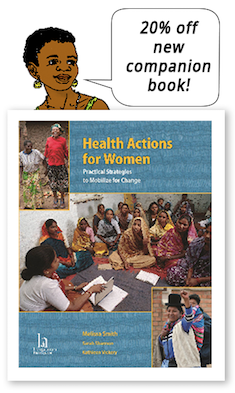Hesperian Health Guides
Working for Change
HealthWiki > Where Women Have No Doctor > Chapter 16: Sexually Transmitted Infections and Other Infections of the Genitals > Working for Change
Preventing STIs can protect you and your partner from serious illness and infertility.
Contents
Reducing your risk of STIs
- Practice safer sex (see Chapter 12, “Sexual Health”).
- Use condoms every time you have sex. Learn how to encourage your partner to use condoms.
 external (male) condom |
 internal (female) condom |
| Use only one of these condoms when you have sex—not both together. |
- Do not douche or use herbs or powders to dry out the vagina. Washing out the vagina with soap or any type of douching works against the natural wetness the vagina makes to stay healthy. A dry vagina can become irritated during sex, making it more likely to be infected with HIV and other STIs.
- If you or your partner have signs of an STI or are being treated for one, wait until you are both completely well before having sex.
- Use sexual touch or have oral sex instead of penis-vagina or penis-anus sex with your partners.
Working for safer sex in the community
Sexually transmitted infections are a health problem for the whole community. To help prevent STIs in your community:
More Information
talking about safer sex- encourage health services to give vaccines for hepatitis B and HPV and to regularly test young people and pregnant people for STIs.
- teach adults and young people about the health risks of STIs. Share this information where people gather, such as the waiting room for women’s health services or where young people go after school.
- work to make condoms more widely accepted and used. Help people practice what they would say to partners who do not want to use condoms.
|

- work to make sure that free or cheap condoms are available at local shops, bars, and cafes as well as from health workers and at health centers.
- train men to encourage other men to use condoms.
- organize a community group to talk about various health problems, including STIs. Explain how preventing STIs will also prevent the spread of HIV infection.
- support schools to provide sex and health education. Help parents understand that teaching children about STIs, including HIV, helps them make safer choices later in life.
- encourage and train teenagers to teach their friends about STIs, including HIV, and to identify reliable sources of online information and share correct information.

After a health worker came to speak with a group of women in our community about STIs and HIV, we began talking about our lives. Some women said they do not worry about STIs. But talking more, we realized that STIs are a problem here. Also, we know men as well as women do not want to get HIV, become infertile, or have pain from STIs. We thought about how to get men to use condoms and decided that we needed to educate the entire community about the dangers of STIs and HIV and how to prevent them. We organized a play and got people from the community to act in it. We created a special character called “Commander Condom” to come to the rescue with condoms. Everyone came to watch the play. People enjoyed it and they also learned. Now the men make jokes about “Commander Condom,” but they are also are using condoms more often.
— Oaxaca, Mexico
To the health worker:
- Find out from the health authorities what medicines work best to treat STIs in your community.
- Offer more STI testing and treatment wherever people get other health services and make sure they are open to everyone. Are all languages spoken? Do young people feel welcome? Will gay and trans people be respected?
- Try to start a community pharmacy so it will be easier for people to get medicines to treat STIs and to get condoms, both external (male) and internal (female), to help prevent them.
- Never judge or blame anyone who needs help with an STI. Offer care and explain how to cure their STI, how to keep from infecting others, and how to keep from getting an STI again. Make sure their partners also get treatment.
- Include information about preventing STIs and HIV in family planning programs.
- Respect the privacy of those with STIs and other health problems. Never talk about their problems with others.





